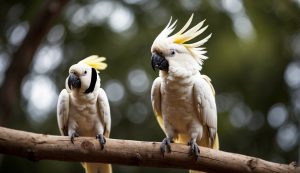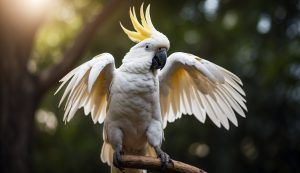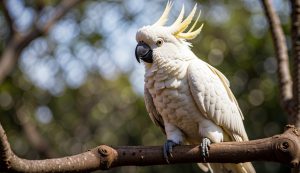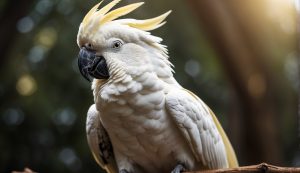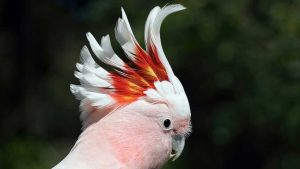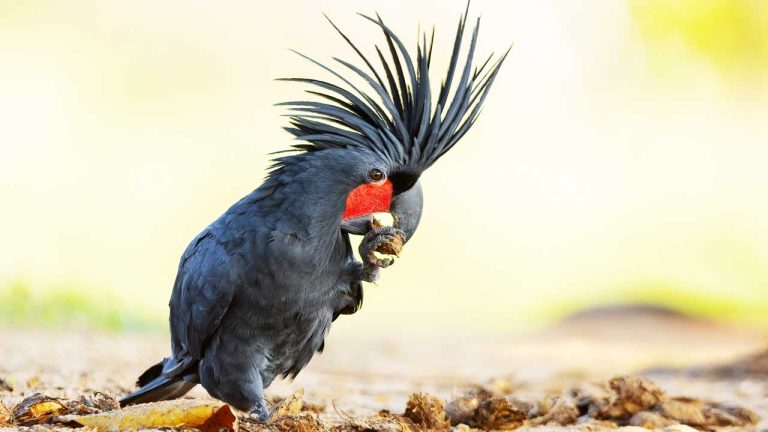Why Is My Cockatoo Shaking? Understanding Your Bird’s Behavior

Observing a cockatoo shaking can be an unsettling experience for any pet owner. Cockatoos are expressive birds, often mirroring their physical actions with their emotional states. These can range from excitement to stress.
When my cockatoo began to shake, it prompted me to look deeper into what might be causing this behavior.
It’s common for cockatoo owners to initially mistake shaking for normal behavior, but it’s important to recognize that shaking might be an indicator of various underlying issues.
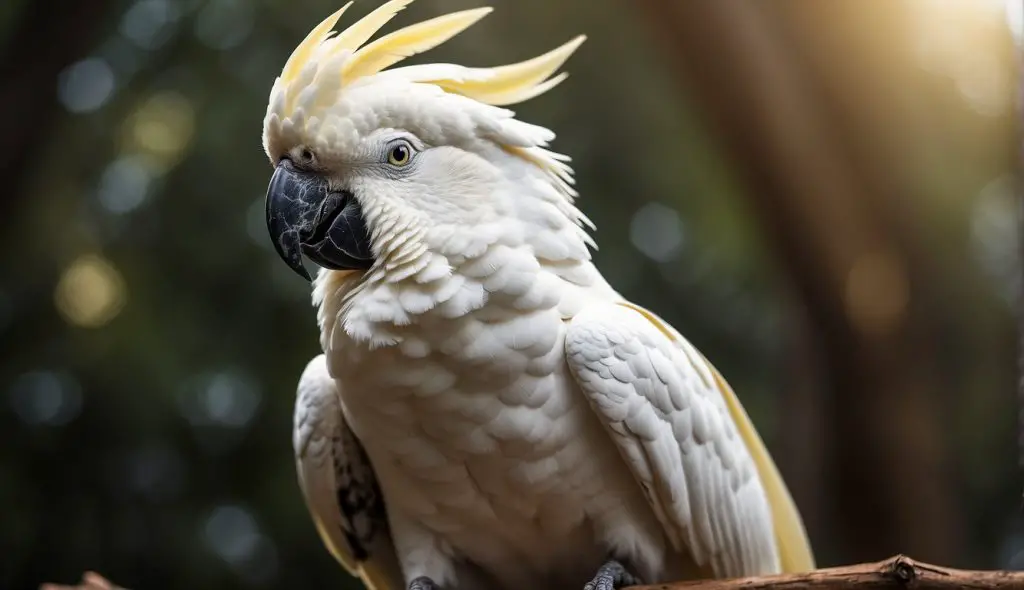
Shaking in cockatoos can be attributed to several factors, such as environmental stressors, fear, medical conditions, or even temperature regulation. Identifying the reason behind the shaking is crucial to ensure the health and well-being of these sensitive creatures.
For example, a deficiency in B vitamins could potentially lead to shaky movements. Therefore, it’s vital to pay close attention to the context in which the shaking occurs and consult a veterinarian if the behavior persists. They can provide an accurate diagnosis and treatment plan.
Key Points
- Cockatoos can shake due to emotional states or underlying health issues.
- Identifying the cause of shaking is important for a cockatoo’s well-being.
- Consultation with a veterinarian is essential if shaking is persistent.
Table of Contents
Understanding Cockatiel Behaviour
When observing cockatiels, it’s essential to pay close attention to their body language as it can reveal a lot about their well-being and emotions.
Common Behaviors and Their Meanings
Preening: This is when I notice my cockatiel running its beak through its feathers. It’s a normal behavior that helps them clean and align their feathers. Frequent preening is a sign of good hygiene and comfort.
Shaking/Trembling: Sometimes my cockatiel shakes its feathers, which can seem similar to trembling. This behavior can be a way to realign their feathers after preening. If they shake their entire body, it could just mean they are excited or happy.
Feather Condition: The state of a cockatiel’s feathers can tell me a lot. Healthy feathers should be smooth and well-preened. If I see feathers fluffed up consistently, it might indicate illness or distress.
- Healthy feathers: Smooth, well-aligned
- Fluffed up: Could indicate cold or illness
Excited Behavior: When my cockatiel is excited or happy, it may exhibit more lively behaviors. These can include chirping more loudly than usual or more movement. Watching their behaviors closely gives me a better understanding of their emotional state.
Body Language: Subtle cues like the position of their crest can also be indicative of their mood. A raised crest usually means they are curious or alert, whereas a flattened crest might show aggression or fear.
- Raised crest: Curiosity, alertness
- Flattened crest: Aggression, fear
Lastly, shaking can be a part of mating rituals, but it’s always important to contextually analyze this behavior with other signs to confirm if it’s related to mating.
Identifying Causes of Shaking in Cockatiels
When my cockatiel starts shaking, it’s crucial to consider both environmental factors and health-related issues to determine the cause. It’s not always a sign of distress, but monitoring for other symptoms can help me figure out if I should be concerned.
Environmental Factors
I always check the room temperature first. Sudden cold drafts or a drop in temperature might cause my cockatiel to shake, as they need a warm and stable environment. Even minor changes can lead to shivering as they try to regulate their body heat. Here are key points to consider:
- Temperature: I make sure the room stays within an ideal temperature range to avoid discomfort from cold or heat.
- Stress Inducers: Loud noises, a new pet, or changes in the household could lead to stress, causing my cockatiel to shake. I observe my bird’s reaction to environmental changes and try to minimize stress factors.
Health-Related Issues
If the environment isn’t the issue, health problems might be causing the shaking. From my experience, symptoms like lethargy, ruffled feathers, or diarrhea might accompany the shaking, indicating a need for a veterinarian visit. Here’s what I look out for:
- Signs of Illness: Weakness or a change in droppings can be a sign my cockatiel is ill. A veterinarian can help diagnose the problem.
- Seizure: Although less common, shaking in cockatiels might be related to a seizure. If shaking is severe and accompanied by incoordination, it’s a cause for concern and requires immediate attention.
Addressing Shaking: Tips and Solutions
In my experience as a cockatoo caretaker, shaking in these birds can be a sign of discomfort or distress. Here, I’ll share some practical steps to ensure the well-being of our feathered companions.
Creating a Comfortable Living Space
A comfortable environment is essential for my cockatoo’s health. Here’s what I make sure to include:
- Perches: I provide a variety of perch sizes to ensure foot health and to mimic their natural habitat.
- Toys: Mental stimulation with toys prevents boredom and stress.
- Temperature: A heated perch can be a game-changer, especially during cooler months.
Diet and Nutrition
I am mindful about what I feed my cockatoo, as diet impacts their overall health:
- Balanced Diet: A mix of seeds, pellets, fruits, and vegetables ensures a nutritionally complete diet.
- Fresh Water: I always keep fresh water available to keep them well-hydrated.
When to Consult an Avian Veterinarian
I know not to hesitate to seek professional help when:
- Persistent Shaking: If the shaking doesn’t stop after making environmental and dietary changes, it’s time to call the avian vet.
- Other Symptoms: If the shaking is accompanied by other signs of illness.
Preventive Measures and Cockatiel Care
I know as a cockatiel owner, you prioritize your bird’s well-being. The key to maintaining a happy and healthy cockatiel lies in regular health check-ups and understanding their behavior, which reflects their need for social interaction and regular exercise.
Regular Check-Ups and Behavioral Monitoring
My first step in preventive care is scheduling regular check-ups with an avian vet. These check-ups are crucial in catching any health issues early on.
During visits, vets look for signs of an imbalanced diet or stress, which can be why a cockatiel might shake.
Monitoring my cockatiel’s behavior daily also plays a fundamental role in their well-being.
Because of their intelligence and social nature, any change in how they act often indicates an underlying issue.
It’s essential to note behaviors such as trembling, which could be a sign of anxiety, illness, or fear, as cockatiels are prey animals by nature.
Keeping an eye on their interaction levels is vital too – cockatiels are social creatures and can develop loneliness if they don’t have enough company.
Ensuring they have regular social interaction with me or other birds, along with the provision of toys and puzzles, helps keep their intellect engaged and reduces the likelihood of stress-related behaviors.
Maintaining a routine that includes regular exercise is another way to support their mental and physical health.
I make a point of allowing my cockatiel out of the cage to explore and fly in a safe environment. This freedom encourages natural behaviors and is essential for their happiness and comfort.
In essence, it’s about creating a stable environment where my cockatiel feels secure and has ample opportunities for mental stimulation and physical activity.
Being proactive in their care schedule and perceptive to changes in their behavior improves their quality of life and reduces adverse conditions such as excessive shaking.
Frequently Asked Questions
What does it mean when a cockatoo is shaking?
Cockatoos may shake for various reasons, including feeling cold, nervous, or stressed.
If your cockatoo is shaking, observe its body language and surroundings to determine the cause. If you are unsure, consult with a veterinarian or an avian expert.
What does it mean when your bird is shaking?
If your bird is shaking, it may be feeling cold, nervous, or stressed. Other possible reasons include illness, injury, or discomfort. Observe your bird’s behaviour and consult with a veterinarian if you are concerned.
How do you stop birds from shivering?
To stop birds from shivering, ensure that their environment is comfortable and appropriate for their species.
Provide adequate heating, bedding, and shelter. If your bird is shivering due to stress or anxiety, try to identify and address the cause of the stress.
What happens if a bird shivers?
If a bird shivers, it may be a sign of discomfort, illness, or stress. Observe your bird’s behaviour and seek veterinary care if you are concerned.
Why does my parrot shake his head up and down?
Parrots may shake their heads up and down as a way of adjusting their crop or clearing their throat.
However, if your parrot is doing this excessively, it may be a sign of illness or discomfort. Observe your parrot’s behaviour and consult with a veterinarian if you are concerned.
Why is my bird shaking while sleeping?
Birds may shake while sleeping as a way of regulating their body temperature or adjusting their position.
However, if your bird is shaking excessively or appears uncomfortable, it may be a sign of illness or discomfort. Observe your bird’s behaviour and consult with a veterinarian if you are concerned.

